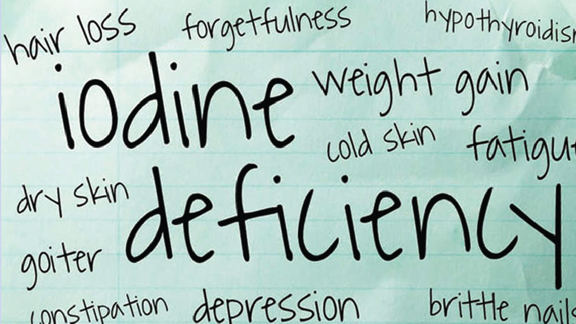
Remember the TV advertisements where they market salt as iodized? Ever wondered why they do that? This is because iodine deficiency is on the rise, so much so that around 71 million people in the country are suffering from goiter and other iodine-deficiency disorders. Hence, including iodine in your daily diet is essential.
Here we tell you about 6 important iodine benefits, foods high in iodine and much more!
Iodine is a non-metallic element found mostly in the oceans and soil. It is a water-soluble trace element that plays a pivotal role in metabolism and the development of the nervous system. Iodine, when combined with potassium, forms potassium iodide. Potassium iodide, when added to processed salt, produces iodized salt.
You need to consume iodine in adequate quantities to sustain various systems in your body, particularly the thyroid glands. An iodine deficiency can have a variety of negative health consequences, which can lead to serious health problems.
Iodine benefits
Here we look deeper into 6 important iodine benefits.
Boosts Immune System
Iodine is a scavenger of free radicals. Free radicals are unstable molecules produced as a result of normal metabolism, a disease, or exposure to toxins. Iodine benefits us by stimulating and increasing the activity of antioxidants throughout the body. This provides a strong defensive measure against various diseases, including heart disease and cancer.

Regulates Metabolic Rate
Iodine influences the functioning of the thyroid glands by assisting the production of hormones, which directly control the body’s base metabolic rate. Metabolic rate affects the efficiency of the organs as well as other regular biological processes like the sleep-wakefulness cycles (circadian rhythm), food absorption, and energy production.
Additionally, the hormones released by the thyroid gland, such as thyroxine and triiodothyronine, influence heart rate, blood pressure, body weight, BMR (basic metabolic rate), and temperature. Thus, ensuring their normal synthesis and distribution in the body is the key to maintaining good health.
Optimizes Energy
Iodine plays an important role in maintaining optimal energy levels in the body by ensuring the efficient utilization of calories without allowing them to be deposited as excess fats.
Prevents Stillbirths
A sufficient quantity of iodine in pregnant women is essential to prevent stillbirths or conditions like cretinism in newborn babies. It can also lead to gestational hypertension, which can result in a lot of complications during infancy.

Iodine ensures proper movement and growth of the baby, along with the proper development of speech as well as hearing abilities. Besides affecting the health of the baby once it is conceived, a deficiency of iodine can contribute to female infertility.
Induces Apoptosis
Iodine promotes apoptosis, or programmed cell death. This is essential in the formation of new organs as well as in the removal of diseased and cancerous cells, which might be harmful to us. This function is mainly due to iodine’s influence on the thyroid gland and its consequent hormonal secretion and regulation.
Removes Toxic Chemicals
Iodine can flush out harmful chemicals like fluoride, lead, mercury, and biological toxins from the body. Additionally, thyroidal iodine has certain anti-bacterial qualities. It is particularly effective against Helicobacter pylori, more commonly called H. Pylori, which has been connected to gastric cancer.
To read more about H. Pylori, click here!
Iodine deficiency
Causes
6 possible factors related to iodine deficiency are:
- Low dietary iodine
- Selenium deficiency on the rise, so much so that around 71 million people in the country are suffering from goiter and other iodine-deficiency disorders. Hence, including iodine in your daily diet is essential.
Here we tell you about 6 important iodine benefits, foods high in iodine and much more!
Iodine is a non-metallic element found mostly in the oceans and soil. It is a water-soluble trace element that plays a pivotal role in metabolism and the development of the nervous system. Iodine, when combined with potassium, forms potassium iodide. Potassium iodide, when added to processed salt, produces iodized salt.
You need to consume iodine in adequate quantities to sustain various systems in your body, particularly the thyroid glands. An iodine deficiency can have a variety of negative health consequences, which can lead to serious health problems.
Iodine benefits
Here we look deeper into 6 important iodine benefits.
Boosts Immune System
Iodine is a scavenger of free radicals. Free radicals are unstable molecules produced as a result of normal metabolism, a disease, or exposure to toxins. Iodine benefits us by stimulating and increasing the activity of antioxidants throughout the body. This provides a strong defensive measure against various diseases, including heart disease and cancer.

Regulates Metabolic Rate
Iodine influences the functioning of the thyroid glands by assisting the production of hormones, which directly control the body’s base metabolic rate. Metabolic rate affects the efficiency of the organs as well as other regular biological processes like the sleep-wakefulness cycles (circadian rhythm), food absorption, and energy production.
Additionally, the hormones released by the thyroid gland, such as thyroxine and triiodothyronine, influence heart rate, blood pressure, body weight, BMR (basic metabolic rate), and temperature. Thus, ensuring their normal synthesis and distribution in the body is the key to maintaining good health.
Optimizes Energy
Iodine plays an important role in maintaining optimal energy levels in the body by ensuring the efficient utilization of calories without allowing them to be deposited as excess fats.
Prevents Stillbirths
A sufficient quantity of iodine in pregnant women is essential to prevent stillbirths or conditions like cretinism in newborn babies. It can also lead to gestational hypertension, which can result in a lot of complications during infancy.

Iodine ensures proper movement and growth of the baby, along with the proper development of speech as well as hearing abilities. Besides affecting the health of the baby once it is conceived, a deficiency of iodine can contribute to female infertility.
Induces Apoptosis
Iodine promotes apoptosis, or programmed cell death. This is essential in the formation of new organs as well as in the removal of diseased and cancerous cells, which might be harmful to us. This function is mainly due to iodine’s influence on the thyroid gland and its consequent hormonal secretion and regulation.
Removes Toxic Chemicals
Iodine can flush out harmful chemicals like fluoride, lead, mercury, and biological toxins from the body. Additionally, thyroidal iodine has certain anti-bacterial qualities. It is particularly effective against Helicobacter pylori, more commonly called H. Pylori, which has been connected to gastric cancer.
To read more about H. Pylori, click here!
Iodine deficiency
Causes
6 possible factors related to iodine deficiency are:
- Low dietary iodine
- Selenium deficiency

Symptoms
Iodine deficiency can have serious effects on the body. The symptoms of its deficiency include:
- Frustration
- Depression
- Mental retardation
- Poor perception levels
- Goitre
- Abnormal weight gain
- Decreased fertility
- Coarse skin
- Chances of stillbirth in expectant mothers
- Constipation, and
- Fatigue
In severe cases, mental retardation associated with diseases such as cretinism, characterized by physical malformations, can be the result of an iodine deficiency. According to WHO reports, iodine deficiency is one of the leading causes of mental retardation all over the world.
Iodine Overdose
Iodine can cause side effects in a few people when taken in high quantities. Sometimes, it tends to cause problems in some people, even if it is not an overdose. Some side effects of iodine are headache, nausea, racing heart, high fever, stomach pain, vomiting, thirst, as well as diarrhea. It is best to consult a doctor when you notice such symptoms. You also need to keep a tab on your iodine intake and make sure you don’t go overboard with it.
One good way to ensure you don’t overdo your iodine intake is to consume it naturally. How? That’s where we are headed.
Foods High in Iodine
Iodine is added to most table salts, so people generally get the required amount from just one teaspoon of iodized salt. Other foods with iodine include both marine plants and animals, including shellfish, deep-water whitefish, and brown seaweed kelp (which can absorb iodine from seawater).

Other examples of foods with iodine are canned sardines, canned tuna, lobster, oysters, salmon, sea bass, and shrimp. Garlic, lima beans, summer squash, sesame seeds, soybeans, turnip greens, and spinach are also some foods with iodine.
Daily recommendation
– The recommended daily allowance for adults is 150 micrograms/day.
– Women who are pregnant or who are breastfeeding require more: 157 micrograms/day and 200 micrograms/day respectively.


.png)


